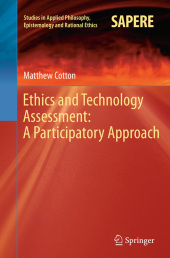 Neuerscheinungen 2016Stand: 2020-02-01 |
Schnellsuche
ISBN/Stichwort/Autor
|
Herderstraße 10
10625 Berlin
Tel.: 030 315 714 16
Fax 030 315 714 14
info@buchspektrum.de |

Matthew Cotton
Ethics and Technology Assessment: A Participatory Approach
Softcover reprint of the original 1st ed. 2014. 2016. xii, 172 S. 8 SW-Abb. 235 mm
Verlag/Jahr: SPRINGER, BERLIN; SPRINGER BERLIN HEIDELBERG 2016
ISBN: 3-662-52167-9 (3662521679)
Neue ISBN: 978-3-662-52167-0 (9783662521670)
Preis und Lieferzeit: Bitte klicken
This book presents a practical participatory process called ´reflective ethical mapping´ which maximizes the potential for non-specialists to engage in debates on the ethics of controversial technologies such as nuclear power and genetically modified foods.
Whether it is nuclear power, geo-engineering or genetically modified foods, the development of new technologies can be fraught with complex ethical challenges and political controversy which defy simple resolution. In the past two decades there has been a shift towards processes of Participatory Technology Assessment designed to build channels of two-way communication between technical specialists and non-expert citizens, and to incorporate multiple stakeholder perspectives in the governance of contentious technology programmes. This participatory turn has spurred a need for new tools and techniques to encourage group deliberation and capture public values, moral and choices. This book specifically examines the ethical dimensions of controversial technologies, and discusses how these can be evaluated in a philosophically robust manner when the ones doing the deliberating are not ethicists, legal or technical experts. Grounded in philosophical pragmatism and drawing upon empirical work in partnership with citizen-stakeholders, this book presents a model called "Reflective Ethical Mapping" - a new meta-ethical framework and toolbox of techniques to facilitate citizen engagement with technology ethics.
Acknowledgements.- List of abbreviations.- Risk and public involvement in technology governance.- Ethics and technology.- Pragmatism, public deliberation and technology ethics.- Ethical tools.- Reflective Ethical Mapping.- Opening up ethical dialogue.- Judging and deciding.- Conclusions.


